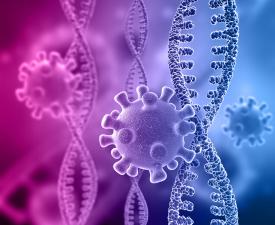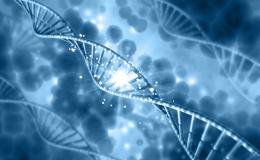Your Genetics May Influence Your Response to COVID-19
March 16, 2021
One of the enduring mysteries surrounding COVID-19 (COVID) is the extreme range of symptoms people can manifest through the course of the disease.

On one hand, a significant percentage of infected people will exhibit no outward symptoms of the disease and many others will only develop mild or moderate symptoms. On the other hand, a much smaller percentage of people will become hospitalized and may succumb to the disease. While several risk factors for severe COVID have been established, such as advanced age, obesity, asthma, and diabetes, not everyone with a risk factor will develop severe COVID, and some people without obvious risk factors die from the disease. Since not every risk factor for severe COVID can be ascertained from a person’s medical history, researchers instead dug into the human genome to discover new and potentially less obvious risk factors for severe COVID.
A team from the United Kingdom recently performed a genome-wide association study (GWAS) comparing the genetic variants, or changes in gene “spelling,” in over 2,000 critical-care patients with severe COVID to the variants found in a control population without any known SARS-CoV-2 (the virus that causes COVID) infection. The study found significant associations between variants at the following genetic locations (loci) and severe COVID:
- Chromosome 3p21.31, spanning the SLC6A20, LZTFL1, CCR9, FYCO1, CXCR6 and XCR1 genes
- Chromosome 12q24.13, in the OAS gene cluster
- Chromosome 19p13.2, near tyrosine kinase 2 (TYK2)
- Chromosome 19p13.3, within dipeptidyl peptidase 9 (DPP9)
- Chromosome 21q22.1, within the interferon receptor gene INFAR2
The locations of the genetic variants identified in the GWAS indicate which genes the variants alter. In turn, the functions of the genes altered by the genetic variants allow the researchers to infer the pathological mechanisms that may be at play in severe COVID cases: innate antiviral defenses (OAS gene cluster, INFAR2) and host-driven inflammatory lung injury (DPP9, TYK2, CCR2). Importantly, understanding these mechanisms can help researchers and physicians repurpose existing medications to avoid or correct maladaptive biological responses that may exacerbate COVID symptoms.1
The Chromosome 3p21.31 locus identified in the U.K. critical-care study was also associated with severe COVID in other genome association studies.2,3 Recently, two researchers further characterized this locus and the variants associated with severe COVID.4 Interestingly, the researchers found that the multiple variants associated with severe COVID are typically inherited together, indicating that this group of genetic variants, or haplotype, may have been introduced into the human population by gene flow from Neanderthals or Denisovans, extinct prehistoric ancestors of present-day humans.
Modern humans, Neanderthals and Denisovans coexisted between 40,000 and 60,000 years ago. If present-day human populations inherited the severe COVID haplotype from Neanderthals or Denisovans, researchers should be able to align the variants found in the risk-conferring haplotype to DNA from the ancestor the haplotype originated from. Remarkably, 11 of the 13 variants found in the severe COVID haplotype were present in the genome of the Vindija 33.19 Neanderthal, a 50,000-year-old Neanderthal from Croatia. Three of the variants were also found in other Neanderthal genomes originating from southern Siberia, but none of the variants were found in Denisovan genome samples. Additional studies by the researchers confirmed that the severe COVID haplotype was introduced to modern humans via gene flow from Neanderthals and not from a common ancestor to both Neanderthals and modern humans.
Currently, the chromosome 3 risk haplotype is present at different frequencies in different populations throughout the world. An estimated 50% of people in South Asia, 16% of Europeans and 9% of Americans carry at least one copy of the haplotype associated with severe COVID, while African populations carry almost no Neanderthal-derived haplotypes. The researchers hypothesize that the risk haplotype was at one time beneficial for surviving infections with other pathogens encountered in different areas of the world. This may have been especially true in places like South Asia, where the haplotype is seen most frequently. In other areas, such as East Asia, the risk haplotype frequency is nearly zero and may have negatively influenced survival with infections with other pathogens, such as other coronaviruses.
Genetic variants that may have protected human populations from pathogens they encountered in the past may now put those same populations at a greater risk for severe COVID. While our retrospective studies will eventually provide some clarity into the genetic variants and biological processes responsible for severe COVID, physicians and scientists are racing against time to adapt new or existing treatments capable of preventing or reversing the pathological mechanisms of the disease. Until effective COVID treatments are widely available, the old adage rings alarmingly true: an ounce of prevention (through mask-wearing, vaccination, testing and social distancing) is worth a pound of (a non-existent) cure.
Kailos Genetics has developed a fully customizable COVID-19 sentinel testing program, Assure SentinelTM, to allow organizations of any size to operate safely during the pandemic. Click here to learn more about the program or contact us with any questions you may have regarding COVID-19 testing.




